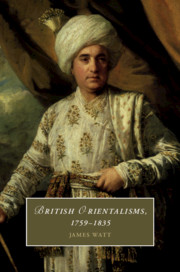Book contents
- British Orientalisms, 1759–1835
- Cambridge Studies in Romanticism
- British Orientalisms, 1759–1835
- Copyright page
- Contents
- Acknowledgements
- Introduction
- Chapter 1 ‘Those Islanders’
- Chapter 2 ‘Indian Details’
- Chapter 3 ‘All Asia Is Covered in Prisons’
- Chapter 4 ‘In Love with the Gopia’
- Chapter 5 ‘Imperial Dotage’ and Poetic Ornament in Romantic Orientalist Verse Narrative
- Chapter 6 Cockney Translation
- Chapter 7 ‘It Is Otherwise in Asia’
- Conclusion
- Bibliography
- Index
- Cambridge Studies in Romanticism
Chapter 6 - Cockney Translation
Leigh Hunt and Charles Lamb’s Eastern Imaginings
Published online by Cambridge University Press: 31 July 2019
- British Orientalisms, 1759–1835
- Cambridge Studies in Romanticism
- British Orientalisms, 1759–1835
- Copyright page
- Contents
- Acknowledgements
- Introduction
- Chapter 1 ‘Those Islanders’
- Chapter 2 ‘Indian Details’
- Chapter 3 ‘All Asia Is Covered in Prisons’
- Chapter 4 ‘In Love with the Gopia’
- Chapter 5 ‘Imperial Dotage’ and Poetic Ornament in Romantic Orientalist Verse Narrative
- Chapter 6 Cockney Translation
- Chapter 7 ‘It Is Otherwise in Asia’
- Conclusion
- Bibliography
- Index
- Cambridge Studies in Romanticism
Summary
In a verse epistle ‘To the Right Honourable Lord Byron on His Departure for Italy and Greece’ (1816), Leigh Hunt expansively addressed the history of English poetry, stating that while ‘our English clime’ is supportive of ‘ripe genius’, Chaucer, Spenser, Shakespeare, and Milton all ‘turned to Italy for added light’, and found inspiration in Italian literary culture of a kind not to be had at home. After framing Italy’s relation to England as that of ‘woman’s sweetness to man’s force’, Hunt’s epistle then presents Italy as the site of sexual temptation, playfully cautioning Byron about the charms of ‘lovely girls, that step across the sight,/ Like Houris in a heaven of warmth and light,/ With rosy-cushioned mouths, in dimples set,/ And ripe dark tresses, and glib eyes of jet’. Hunt thus declared his intimacy with Byron while at the same time casually Orientalizing the Mediterranean. Whereas Hunt’s contemporary J. H. Reynolds invoked ‘ye Houries!’ and asked them to ‘smile’ on his ‘bold attempt/ With Eastern charms to decorate’ his Byron-derivative Safie: An Eastern Tale (1814), Hunt here drew upon seraglio discourse in a more self-consciously worldly fashion, adopting a romance idiom comparable to that of Moore’s Lalla Rookh and anticipating the terms of the ‘witching scene’ faced by Azim in ‘The Veiled Prophet of Khorasan’.
- Type
- Chapter
- Information
- British Orientalisms, 1759–1835 , pp. 192 - 226Publisher: Cambridge University PressPrint publication year: 2019



